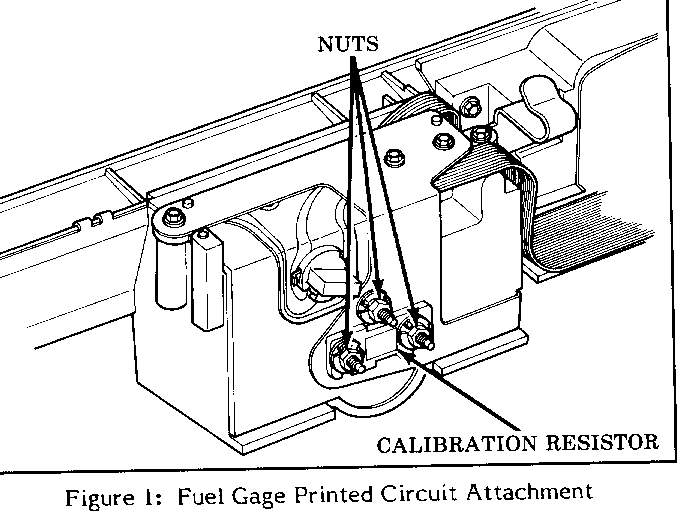FUEL GAGE READS LOW POOR ELECTRICAL CONNECTION

VEHICLES AFFECTED: 1984 RWD Devilles and Fleetwoods 1985 RWD Fleetwood Broughams
Some fuel gauges on 1984 Devilles and Fleetwoods and 1985 Fleetwood Broughams may indicate 'empty' or 'very low' regardless of the actual fuel level in the tank. This condition may be due to a poor connection at the rear of the fuel gauge unit. There are three threaded studs on the back of the fuel gauge housing used to retain the flexible printed circuit and calibration resistor. Each stud has two nuts that hold the printed circuit to the housing (refer to Figure 1). If one or more of these nuts are loose, an open circuit could result causing the fuel gauge indicator needle to point low or to 'E'. The low fuel indicator light may also not illuminate with this condition.
If any of these nuts are loose, a wave washer (P/N 25046872) should be added to each stud between the lower nut and printed circuit. This will increase the compression tension between the two nuts and close the open circuit.
CAUTION:
The nuts should be tightened to 5 to 8 in.-oz. Over-tightening the nuts could strip the stud and/or damage the calibration resistor.
If this condition still exists after the above procedure, continue with fuel gauge diagnosis as outlined in Service Manual Section 8A, page 211, Mechanical Instrument Cluster Troubleshooting Hints, and Section 8C, page 24, Fuel Gauge Diagnosis.

General Motors bulletins are intended for use by professional technicians, not a "do-it-yourselfer". They are written to inform those technicians of conditions that may occur on some vehicles, or to provide information that could assist in the proper service of a vehicle. Properly trained technicians have the equipment, tools, safety instructions and know-how to do a job properly and safely. If a condition is described, do not assume that the bulletin applies to your vehicle, or that your vehicle will have that condition. See a General Motors dealer servicing your brand of General Motors vehicle for information on whether your vehicle may benefit from the information.
